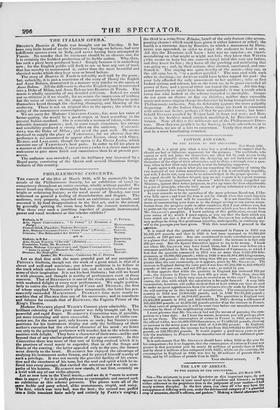COTTON AND CORN.
To THE Enlrolt Ok"ritE SrEcTATOR.
.21st March 18,16,
SIR—It is a great pity when a man has a gnod cause to support that he should use bad or fallacious arguments for the purpose. The multitude, who cannot or will not judge for themselves, are often led by such means to the adoption of plausible errors, while the designing are not backward to avail themselves of the slips of their adversaries, and to claim a triumph over a ques- tion, when in fact their only triumph is over its bungling supporters.
I quite age i
ee with you in what you say regarding the mpolicy of taxing the raw material of our cotton manufacture : such a tax is exceedingly impolitic, and will, I doubt not, very soon he so acknowledged in the proper quai ter. If the repeal should he further delayed, may we not impute it in a great measure to that " ignorant impatience of taxation " which has already compelled our Ministers, against their better judgment, to give up taxes the least objectionable in psint of principle, whereby their means of giving substantial relief in a less popular manner have been lessened ?
In your remarks as to the operation of the more grievous Bread-tax, I like- wise fully agree ; and trust the time is not fir distant when this cruel injustice
of the possessors of land will be remedied also. It is not therefore with the desire of controverting your fears as to the danger arising to our cotton manu- facture from the progress made in other countries, that I now address you, but to point out the error and fallacy of the statements which you have drawn from Mr. GRAHAM'S pamphlet. I know nothing of this publication, except from your notice of it ; which I must regret, as you say that the facts which you have stated are but a few of those which Mr. GRAIL% M has collected, and I may perhaps be doing that gentleman injustice, undesignedly, in confining my- self to the passages you have given. With this reservation I proceed to the qaestion. It is stated that the quantity of cotton consumed in France in 1812 was 25,191,189 pounds, and that in 1826 it had been increased to 83,993,210 pounds, or 310 per cent. Any one accustomed to make calculations must see at a glance that this percentage is wrongly stated : the increase is in fact only =3 per cent. But the figures themselves appear to me to be wrong. I know not where Mr. GRAHAM may have found them, but I have now before me a statement published in 1835 by the French Minister of Commerce, in which I &id that the quantity consumed in 1812 was no more than 6,343,230 kilo- grammes, or 13,986,822 pounds ; while in 1826 it was 31,914,494 kilogrammes, or 70,371,459 pounds: the increase being thus 403 per cent., and consequently greater than the rate erroneously, as it appears, given by Mr. GRAHAM. The increase in England during the same period was from 61,285,936 to 162,889,012 pounds, or 165 per cent., and not 270 per cent., as stated by you. It thus appears that while the quantity in England has increased 165 per cent., the increase in France has been 403 per cent. What, then, does this prove? that France is likely very soon to overtake us in the race? This is, of course, the idea with which the calculation is brought forward. A very little examination, however, will suffice to show that at least within our time we need be under no great apprehension from the advances already made by France that
she will outstrip us in this branch of manufacture. The cons ption in that country in 1812 was 13,986,822 pounds, and in 1826 70,371,459 pounds ; showing an increase of 56,384,637 pounds. The quantities in England were 61,285,636 pounds in 1812 and 162,859,012 in 1823; showing a difference of 101,603,988 pounds, or 45,219,351 pounds greater than the increase in France. At these rates of progression it will be some time before our manufacturers are overtaken by those of the neighbouring country.
I must presume that Mr. GRAHAM bad not the means of pursuing the com- parison to a later date. As I have the means, however, you will perhaps allow me to use them. The consumption of cotton in France in 1803, according to the official tables, was 35,609,819 kilogrammes, or 78,519,651 pounds, showing an increase in the seven years from 1526 of 8,148,192 pounds. In England, during the same period, the increase has been from 162,689,012 to 293.682,976 pounds, or 130,793,964 pounds. It would require a good many years to pro- vide the machinery in France for the manufacture of such au additional quan- tity of cotton.
It is unfortunate that Mr. GRAHAM should have taken 1826 as the year for his comparison ; for it so happens, that the consumption of cotton in France was greater in that particular year by nearly 16 millions of pounds than in 1825, and by about 5 millions when compared with 1827; while, on the contrary, the consumption in England in 1826 was less by 40 millions of pounds than in 1825, and by 87 millions of pounds than in 1827.
Your obedient servant, P.


























 Previous page
Previous page